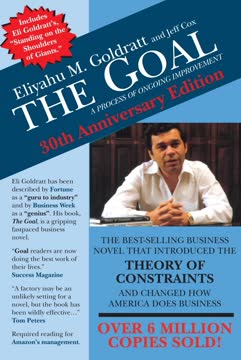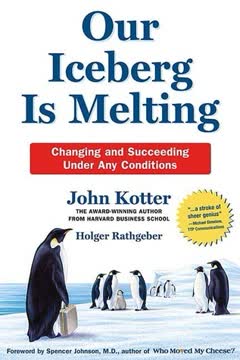Key Takeaways
1. Leadership is About Influence, Not Position
Leadership is the skills of influencing people to enthusiastically work toward goals identified as being for the common good, with character that inspires confidence.
Leadership transcends titles. True leadership is not about wielding power from a position of authority, but about having the ability to inspire and guide others towards shared objectives. This influence stems from a leader's character and actions, not their job title or formal authority.
Influence is earned, not given. Unlike power, which can be bestowed by title or position, influence must be cultivated through consistent behavior that inspires trust and respect. Effective leaders focus on developing their ability to influence others through:
- Building strong relationships
- Demonstrating integrity and consistency
- Showing genuine care for their team members
- Leading by example
Impact beyond formal authority. Anyone in an organization can demonstrate leadership by positively influencing others, regardless of their official role. This concept of leadership emphasizes the importance of character development and interpersonal skills over mere technical competence or positional power.
2. Servant Leadership: The Most Powerful Approach
The greatest leader is the greatest servant, the one most dedicated to meeting the needs out there in a hurting world full of needs.
Prioritize others' needs. Servant leadership flips the traditional power structure on its head. Instead of using their position for personal gain, servant leaders focus on identifying and meeting the legitimate needs of their team members and stakeholders.
Build authority through service. By consistently serving others, leaders build a deep well of trust and influence. This approach creates a positive cycle:
- Leader serves and meets needs
- Team members feel valued and supported
- Trust and respect for the leader grow
- Team becomes more engaged and committed
- Organizational goals are achieved more effectively
Long-term effectiveness. While servant leadership may require more effort initially, it creates a sustainable culture of mutual support and high performance. This contrasts with power-based leadership, which can produce short-term results but often leads to damaged relationships and diminished long-term effectiveness.
3. Character is the Foundation of Effective Leadership
Character is what a man is in the dark.
Character defines actions. A leader's true character is revealed in their consistent choices and behaviors, especially when no one is watching. It's not about personality or charisma, but about the core values and principles that guide decision-making and interactions with others.
Developing character is an ongoing process. Unlike personality, which is largely set by early adulthood, character can and should be continuously developed throughout life. Key aspects of character development for leaders include:
- Self-awareness and reflection
- Commitment to ethical principles
- Willingness to receive feedback and grow
- Consistency between stated values and actions
- Courage to do the right thing, even when difficult
Character impacts all areas of leadership. A leader's character influences their ability to:
- Build trust with team members
- Make ethical decisions
- Handle adversity and challenges
- Inspire others to reach their potential
- Create a positive organizational culture
4. Love in Leadership: The Verb, Not the Feeling
Love is patient, love is kind, it is not puffed up or arrogant (humble), it does not act unbecomingly (respectful), it does not seek its own (selfless), it does not take into account a wrong suffered (forgiving), it does not rejoice in unrighteousness but rejoices in the truth (honest), it bears all things, endures all things, it never fails (committed).
Love as action, not emotion. In the context of leadership, love is not about romantic feelings, but about consistently choosing to act in ways that benefit others. This type of love is characterized by patience, kindness, humility, respect, selflessness, forgiveness, honesty, and commitment.
Leadership qualities mirror love. The qualities that define effective leadership closely align with the characteristics of love described above. Great leaders demonstrate:
- Patience in developing team members
- Kindness in interactions
- Humility in decision-making
- Respect for all individuals
- Selflessness in prioritizing team and organizational needs
- Forgiveness when mistakes occur
- Honesty and integrity in all dealings
- Unwavering commitment to the team and mission
Cultivating a loving leadership approach. Leaders can develop these qualities through:
- Self-reflection and awareness
- Intentional practice of these behaviors
- Seeking feedback on their interactions
- Studying examples of great leaders who embodied these qualities
5. Accountability and Kindness: The Dual Pillars of Leadership
Leadership is an awesome responsibility.
Balance is key. Effective leaders must strike a balance between holding people accountable for their performance and treating them with kindness and respect. This dual approach creates an environment of high standards and strong support.
Accountability:
- Set clear expectations and standards
- Provide regular feedback on performance
- Address issues promptly and directly
- Help team members develop improvement plans
- Recognize and reward excellent performance
Kindness:
- Show genuine care for team members' well-being
- Listen empathetically to concerns and ideas
- Offer support and resources for growth
- Celebrate successes and milestones
- Create a positive and encouraging work environment
The "hug and spank" approach. Leaders must be able to provide both positive reinforcement ("hugs") and constructive criticism or consequences ("spanks") as needed. This balanced approach helps team members feel valued while also driving continuous improvement and accountability.
6. Human Nature and the Capacity for Change
Human nature is going to the bathroom in your pants!
Overcoming natural tendencies. Just as we learn to control our bodily functions, we can also develop the self-control and discipline needed to overcome our less desirable natural tendencies. This applies to leadership behaviors and character development.
The dual nature of humans. People have the capacity for both good and evil, selflessness and selfishness. Effective leaders:
- Recognize this duality in themselves and others
- Work to cultivate positive traits and behaviors
- Create environments that bring out the best in people
- Provide support and accountability for growth
Change is possible, but challenging. While people can change and grow, it requires:
- Strong motivation and commitment
- Clear understanding of desired behaviors
- Consistent practice and reinforcement
- Supportive environment and accountability
- Patience and persistence through setbacks
7. The Three F's of Leadership Development: Foundation, Feedback, Friction
We need to be reminded more often than we need to be instructed.
Foundation: Set the standard. Provide clear education on leadership principles and expectations. This creates a shared understanding of what good leadership looks like within the organization.
Feedback: Identify gaps. Use 360-degree assessments and other feedback mechanisms to help leaders understand the gap between their current performance and the desired standard. This creates awareness and motivation for improvement.
Friction: Eliminate gaps and measure results. Create accountability and support for ongoing development:
- Set specific, measurable goals for improvement
- Provide regular check-ins and progress reviews
- Offer resources and training to support growth
- Create peer support and accountability groups
- Celebrate progress and successes
This three-step process creates a continuous cycle of learning, awareness, and improvement for leaders at all levels of the organization.
8. True Motivation Comes from Within, Not External Rewards
You get the best effort from others not by lighting a fire beneath them, but by building a fire within them.
Intrinsic vs. extrinsic motivation. While external rewards (like money or promotions) can provide short-term motivation, true engagement and sustained high performance come from internal drives.
Key intrinsic motivators:
- Sense of purpose and meaning in work
- Opportunities for growth and development
- Recognition and appreciation for contributions
- Autonomy and trust in decision-making
- Feeling part of a high-performing team
- Alignment between personal and organizational values
Creating an environment for intrinsic motivation. Leaders can foster intrinsic motivation by:
- Clearly communicating the organization's mission and impact
- Providing regular, specific feedback and recognition
- Offering challenging assignments and growth opportunities
- Giving team members appropriate autonomy and decision-making power
- Building a strong sense of team and community
- Aligning individual roles with organizational purpose
9. Meeting Deeper Human Needs in Organizations
The modern workplace can be an extraordinarily powerful character-building institution.
Beyond basic needs. While fair compensation and safe working conditions are important, truly engaging workplaces address deeper human needs:
- Need for great leadership
- Need for meaning and purpose
- Need to be appreciated, recognized, and respected
- Need to be part of something excellent (special)
- Need to be part of a caring community
Creating a fulfilling work environment. Organizations that meet these deeper needs tend to have:
- Higher employee engagement and retention
- Increased innovation and productivity
- Stronger customer loyalty
- Better financial performance
- Positive impact on employees' lives beyond work
Holistic approach to organizational success. By focusing on developing great leaders, fostering a sense of purpose, recognizing contributions, striving for excellence, and building a supportive community, organizations can create a virtuous cycle of individual and collective growth and success.
Last updated:
FAQ
What's "The World's Most Powerful Leadership Principle" about?
- Servant Leadership Focus: The book by James C. Hunter explores the concept of servant leadership, emphasizing that true leadership is about serving others rather than exercising power over them.
- Character and Influence: It delves into how leadership is built on character and the ability to influence others through personal integrity and service.
- Practical Guidance: The book provides practical steps and a framework for implementing servant leadership principles in personal and professional life.
- Cultural Shift: It addresses the need for a cultural shift in leadership styles, moving away from traditional power-based models to those that prioritize the needs of others.
Why should I read "The World's Most Powerful Leadership Principle"?
- Transformative Approach: The book offers a transformative approach to leadership that can improve both personal and organizational effectiveness.
- Universal Principles: It presents timeless principles that are applicable across various contexts, making it relevant for leaders in any field.
- Practical Tools: Readers gain access to practical tools and strategies for developing leadership skills and building character.
- Real-World Examples: The book includes real-world examples and testimonials from successful leaders who have applied these principles.
What are the key takeaways of "The World's Most Powerful Leadership Principle"?
- Leadership as Service: True leadership is about serving others and meeting their legitimate needs, which builds authority and influence.
- Character Development: Leadership development is synonymous with character development, requiring a commitment to personal growth and ethical behavior.
- Feedback and Accountability: Effective leadership involves seeking feedback, holding oneself accountable, and continuously striving for improvement.
- Motivation from Within: Genuine motivation comes from inspiring others and aligning their work with a greater purpose, rather than relying on external rewards or punishments.
How does James C. Hunter define servant leadership?
- Influence Over Power: Servant leadership is defined as influencing others to work towards common goals by serving their needs, rather than using power or coercion.
- Character-Based: It is built on the foundation of character, where leaders earn authority through their actions and integrity.
- Service and Sacrifice: Leaders must be willing to serve and sacrifice for the benefit of those they lead, fostering trust and commitment.
- Practical Application: The book provides a roadmap for implementing servant leadership principles in everyday interactions and organizational practices.
What are the best quotes from "The World's Most Powerful Leadership Principle" and what do they mean?
- "To lead is to serve." This quote encapsulates the core message of the book, emphasizing that leadership is about prioritizing the needs of others.
- "Leadership is character in action." It highlights the importance of character in leadership, suggesting that true leadership is demonstrated through ethical behavior and integrity.
- "You cannot manage people; you lead people." This quote distinguishes between management and leadership, underscoring that leadership is about inspiring and influencing people, not just managing tasks.
- "The ultimate test of leadership is this: Are the people better off when they leave than when they got there?" It challenges leaders to focus on the growth and well-being of their followers.
How does the book suggest implementing servant leadership?
- Foundation of Principles: Start by understanding and embracing the principles of servant leadership, such as humility, respect, and selflessness.
- Feedback Mechanisms: Use tools like 360-degree feedback to identify gaps in leadership skills and areas for improvement.
- Action Plans: Develop specific, measurable, achievable, relevant, and time-bound (SMART) action plans to address identified gaps.
- Continuous Improvement: Commit to ongoing personal and professional development, holding oneself accountable to higher standards of leadership.
What is the difference between power and authority according to James C. Hunter?
- Power Defined: Power is the ability to force or coerce others to do your will because of your position or might.
- Authority Defined: Authority is the skill of getting others to willingly do your will because of your personal influence and character.
- Relationship Impact: Power can damage relationships over time, while authority builds trust and commitment.
- Long-Term Effectiveness: Authority is more sustainable and effective in the long term, as it is based on mutual respect and influence.
How does "The World's Most Powerful Leadership Principle" address motivation?
- Internal Motivation: True motivation comes from within, driven by a sense of purpose and alignment with personal values.
- Beyond Rewards: The book argues that external rewards and punishments (KITA) are not true motivators and do not inspire long-term commitment.
- Meeting Needs: Leaders should focus on meeting the deeper needs of their followers, such as recognition, growth, and meaningful work.
- Building Community: Creating a sense of community and belonging can significantly enhance motivation and engagement.
What role does character play in leadership according to the book?
- Foundation of Leadership: Character is the foundation of effective leadership, as it determines a leader's ability to influence and inspire others.
- Moral Maturity: Character involves moral maturity and the commitment to doing the right thing, even when it is difficult.
- Habit Formation: Building character is about developing positive habits and consistently making ethical choices.
- Leadership Development: Leadership development is synonymous with character development, requiring continuous self-improvement and reflection.
How does the book suggest leaders handle accountability?
- Honesty and Integrity: Leaders must hold themselves and others accountable to maintain honesty and integrity within the organization.
- Constructive Discipline: Accountability should be approached as an opportunity to teach and guide, rather than punish.
- Clear Expectations: Set clear expectations and standards for behavior and performance, and communicate them effectively.
- Consistent Follow-Through: Consistently follow through on accountability measures to build trust and credibility.
What are the challenges of implementing servant leadership?
- Cultural Shift: Transitioning from a power-based leadership model to a servant leadership model requires a significant cultural shift.
- Resistance to Change: Leaders may face resistance from those accustomed to traditional leadership styles and power dynamics.
- Commitment to Growth: Implementing servant leadership requires a long-term commitment to personal and organizational growth.
- Balancing Tasks and Relationships: Leaders must balance the demands of achieving organizational goals with the need to build strong relationships.
How does "The World's Most Powerful Leadership Principle" relate to personal growth?
- Self-Reflection: The book encourages leaders to engage in self-reflection and assess their own character and leadership skills.
- Continuous Improvement: Personal growth is achieved through continuous improvement and the willingness to change and adapt.
- Alignment with Values: Aligning personal values with leadership practices enhances authenticity and effectiveness.
- Empowerment Through Service: Serving others and meeting their needs can lead to personal fulfillment and a sense of purpose.
Review Summary
The World's Most Powerful Leadership Principle receives mixed reviews, with an average rating of 3.98/5. Many readers appreciate its focus on servant leadership and character development, finding the principles insightful and applicable. Some praise its practical strategies and breakdown of leadership skills. However, critics note repetitiveness, excessive verbosity, and heavy religious references. Some readers find the writing style weak or the content lacking depth. Overall, the book is seen as a valuable resource for those interested in servant leadership, despite its flaws.
Similar Books










Download PDF
Download EPUB
.epub digital book format is ideal for reading ebooks on phones, tablets, and e-readers.





